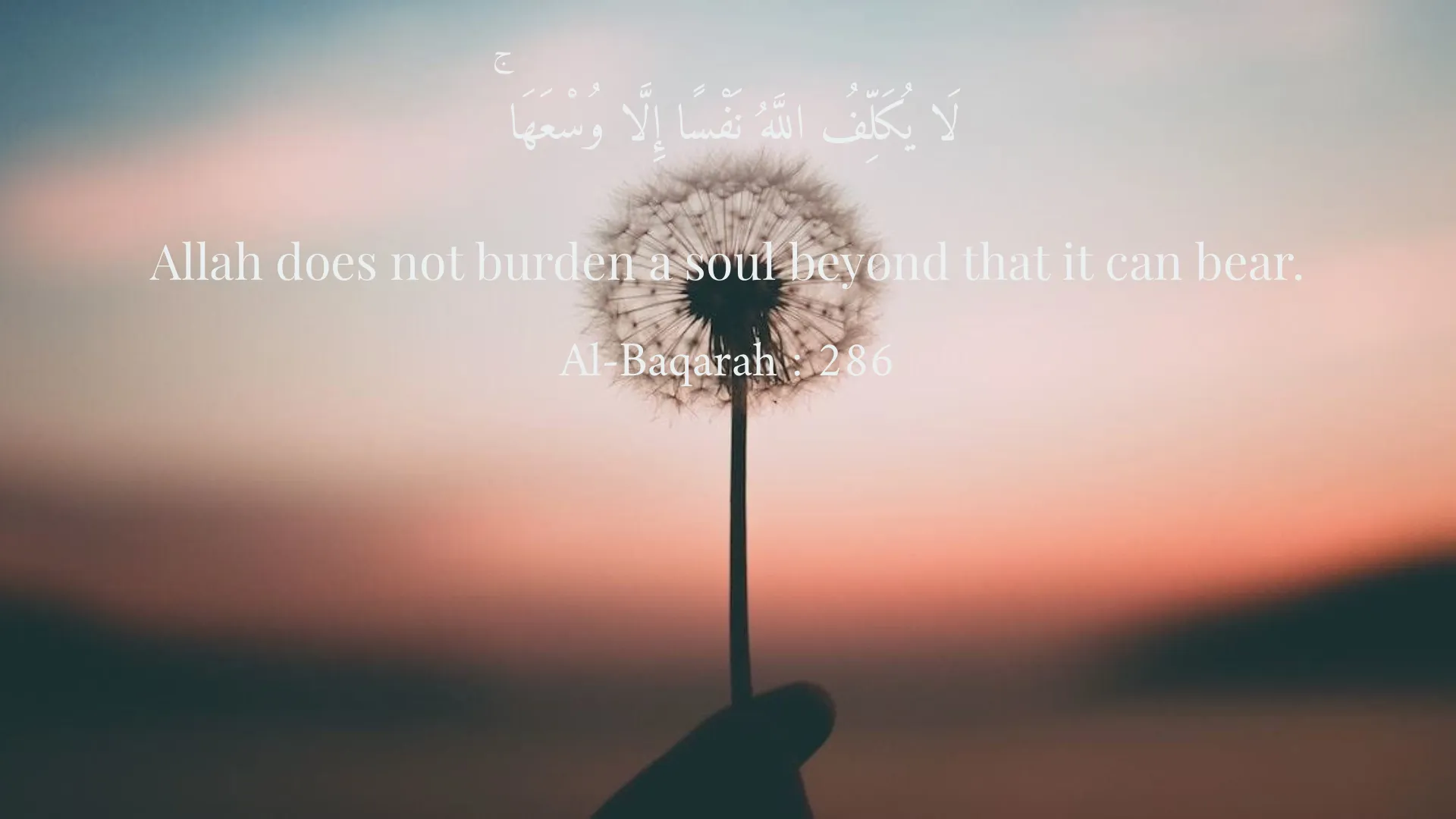Quranic Answer

The Holy Quran, revered as the ultimate guide for millions of Muslims around the world, recognizes and acknowledges the full spectrum of human emotions. Among these, sadness is a prevalent feeling that arises in the complex circumstances of life. Whether it springs from loss, disappointment, or unforeseen challenges, sadness is an intrinsic aspect of the human experience. The Quran provides profound insights into understanding and managing this emotion, combining spiritual wisdom with practical advice. One of the key verses that addresses this struggle is found in Surah Al-Baqarah, specifically verse 286, which reads, "Allah does not burden a soul beyond that it can bear." This divine promise serves as a reminder that every individual possesses inherent strength and resilience. When faced with sadness, it is critical to remember that the trials one encounters are always within the capacity of one's endurance. Life's challenges, no matter how daunting, can be managed, as evinced by the reassurance from Allah in the Quran. Sadness, while often debilitating, is also a profound teacher. It has the capacity to bring forth self-reflection and a deeper connection with one's spirituality. The moments of sorrow can pave the way for personal growth and development. These instances encourage believers to turn to God for solace. In verse 153 of the same surah, it is articulated that believers are encouraged to seek help through patience and prayer. "O you who have believed! Seek help through patience and prayer. Indeed, Allah is with the patient." This emphasizes the importance of both patience and spiritual practices in coping with emotional turmoil. The act of praying during challenging times creates a bridge between the believer and God, allowing individuals to pour out their hearts and seek divine intervention. Prayer serves as a refuge where one can express grief, fears, and hopes in a nurturing space. This act reaffirms the understanding that while sadness is a natural emotion, so too is the capacity to seek help and healing. Furthermore, the Quran does not merely compel us to endure sadness; it also offers a profound assurance of hope. In Surah Al-Inshirah, verses 5 and 6 receive attention, proclaiming, "Indeed, with hardship comes ease." This duality of hardship followed by ease presents an essential element of the human experience: the existence of light at the end of the tunnel. For those grappling with sadness, this urging towards hope acknowledges that every trial, no matter how challenging, is temporary and accompanied by relief. Understanding this principle provides comfort to individuals engulfed in sadness. One of the wisdoms woven into this assurance is that every period of hardship serves a purpose. It initiates a cycle through which individuals can emerge stronger, wiser, and more attuned to their faith. This cycle encourages believers to trust in God's mercy and timing, fostering patience and resilience in the face of sorrow. In contemplating these verses, one may find that the Quran does not dismiss sadness as a negative emotion to be repressed or ignored. Instead, it normalizes the experience of sadness as part and parcel of life. The beauty lies in how the Quran guides believers towards processing this emotion through spiritual means, all while fostering a sense of community and support among individuals facing common trials. The fellowship amongst believers can also extend emotional support during troubling times. The shared human experience can serve as a reminder that one is never truly alone in their struggles. Engaging with community through acts of worship, charity, and mutual support fuels a collective emotional resilience, reinforcing the sense of security in the spiritual journey. Additionally, reflecting on external sources that can be drawn from the Quran aids in understanding individual contexts of sadness. Grieving for a lost loved one, confronting personal or professional setbacks, or dealing with illness are all situations in which sadness might naturally arise. Each of these instances can be met with the comforting words of the Quran, encouraging individuals to reach for their faith as a means of guidance and strength. In conclusion, the Holy Quran offers a sanctuary of wisdom for those experiencing feelings of sadness. It acknowledges the validity of these emotions while emphasizing the necessity of patience, prayer, and hope. The promises found within its verses remind individuals of their inherent resilience and the transient nature of hardship. Through reliance on God, a community of support, and the embrace of one’s emotions, believers are urged to find peace amid life’s adversities. Ultimately, the teachings of the Quran guide individuals to navigate through their sadness, emerging with renewed strength and a deeper understanding of their faith and purpose in life.
Related Verses
لَا يُكَلِّفُ اللَّهُ نَفْسًا إِلَّا وُسْعَهَا ۚ
Allah does not burden a soul beyond that it can bear.
Al-Baqarah : 286
يَا أَيُّهَا الَّذِينَ آمَنُوا اسْتَعِينُوا بِالصَّبْرِ وَالصَّلَاةِ ۚ إِنَّ اللَّهَ مَعَ الصَّابِرِينَ
O you who have believed, seek help through patience and prayer. Indeed, Allah is with the patient.
Al-Baqarah : 153
فَإِنَّ مَعَ الْعُسْرِ يُسْرًا
Indeed, with hardship comes ease.
Al-Inshirah : 5
Short Story
One day, a man named Yusuf was very sad due to financial troubles. He visited a religious scholar and spoke about his problems. The scholar told him, "Don't worry, Allah says that after every hardship comes ease." Hearing this from the Quran brought Yusuf a greater sense of peace, and he decided to focus on his patience and perseverance. He realized that feeling sad is natural and he must manage this feeling by relying on God.